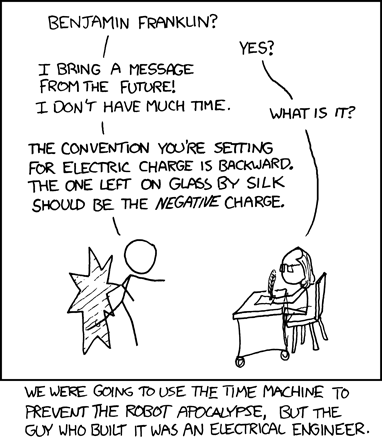John Carlos Baez on Nostr: Why do we call electrons 'negative' and protons 'positive'? It's an arbitrary ...
Why do we call electrons 'negative' and protons 'positive'? It's an arbitrary convention but it's annoying: it means that when electrons flow through wires, the current is defined to flow in the OTHER DIRECTION.
If you ask people why electrons got called 'negative', you get a bunch of crap answers:
"Electrons are referred to as negative because of their behavior in an electric field. In an electric field, an electron will move from the negative pole to the positive pole, giving it a negative charge by convention."
Yes, but why THAT convention?
"If we re-designate all positive electric charges as negative and vice versa, while keeping their absolute value, the resulting physics would be the same. So exact choice is merely a matter of convention."
Yeah, it's a convention - but why THAT convention?
"In quantum theory of elementary particles (in a sense of irreducible representation of Poincare group with mass m and spin (helicity) s) if some operator Q of internal symmetry commutes (like electric charge charge) with Hamiltonian H...."
Irrelevant crap which never leads up to an answer.
The answer is that Benjamin Franklin chose this convention and nobody knows why.
In Franklin's day there was a 'two-fluid' theory of electricity saying electricity comes in two kinds. Around 1750 he developed a 'one-fluid' theory after showing that a rubbed glass receives an equal but opposite charge as the cloth used to rub the glass. He decided that electrical fluid was going into the glass. So he said the charge of the glass was 'positive' and the cloth was 'negative'.
Unfortunately it turns out that that electrons are going into the cloth.
The whole history is interesting:
https://en.wikipedia.org/wiki/Electric_charge#History

If you ask people why electrons got called 'negative', you get a bunch of crap answers:
"Electrons are referred to as negative because of their behavior in an electric field. In an electric field, an electron will move from the negative pole to the positive pole, giving it a negative charge by convention."
Yes, but why THAT convention?
"If we re-designate all positive electric charges as negative and vice versa, while keeping their absolute value, the resulting physics would be the same. So exact choice is merely a matter of convention."
Yeah, it's a convention - but why THAT convention?
"In quantum theory of elementary particles (in a sense of irreducible representation of Poincare group with mass m and spin (helicity) s) if some operator Q of internal symmetry commutes (like electric charge charge) with Hamiltonian H...."
Irrelevant crap which never leads up to an answer.
The answer is that Benjamin Franklin chose this convention and nobody knows why.
In Franklin's day there was a 'two-fluid' theory of electricity saying electricity comes in two kinds. Around 1750 he developed a 'one-fluid' theory after showing that a rubbed glass receives an equal but opposite charge as the cloth used to rub the glass. He decided that electrical fluid was going into the glass. So he said the charge of the glass was 'positive' and the cloth was 'negative'.
Unfortunately it turns out that that electrons are going into the cloth.
The whole history is interesting:
https://en.wikipedia.org/wiki/Electric_charge#History
